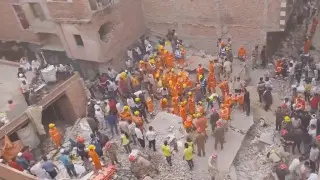
Nitish Kumar Tejashwi Yadav (ANI (Representative Image))
The recent meeting between Bihar Chief Minister Nitish Kumar and Leader of the Opposition Tejashwi Yadav was anything but an impromptu encounter. Despite appearances, the meeting was pre-arranged, though it’s plausible that it served as a front for a deeper, more strategic agenda. Officially, the meeting was convened to discuss the appointment of the Information Commissioner—a decision typically made by a committee that includes the Chief Minister, the Leader of the Opposition, and several Cabinet members, with the Chief Minister presiding over the discussions.
After the meeting, Tejashwi Yadav informed the media that the Information Commissioner’s appointment would be announced shortly. He added that a few other appointments were also discussed, with official details to follow. However, Yadav’s remarks hinted at a broader conversation, particularly concerning the caste census—a subject that has previously triggered significant political shifts in Bihar. In 2022, discussions around the caste census between Yadav and Kumar led to a pivotal change, with Nitish Kumar breaking away from the NDA to lead the Mahagathbandhan alliance as Chief Minister.
Could this meeting signal another impending political upheaval in Bihar? The encounter has certainly stirred anxiety within the BJP ranks, and RJD chief Lalu Yadav has also called for a meeting of his party’s legislators. Although the meeting was officially about the Information Commissioner’s appointment, the dialogue extended to the caste census, a topic gaining traction not just in Bihar but across the country. It was under Nitish Kumar’s earlier government, in collaboration with Tejashwi Yadav, that the foundations for the caste census were laid in Bihar. At that time, Kumar skillfully maneuvered the BJP into supporting the initiative at every step. Even now, the BJP seems to be on the defensive regarding the caste census. The Rashtriya Swayamsevak Sangh (RSS), the BJP’s ideological parent, has also expressed support for the caste census, albeit with the stipulation that it should not be used for political gains—a difficult promise to keep.
Tejashwi Yadav revealed that he discussed with the Chief Minister the inclusion of the caste census proposal, passed by the Bihar Assembly, in the Ninth Schedule of the Constitution. Bihar has recommended this to the central government, a move already communicated by Nitish Kumar. As an ally in the NDA government, Kumar is expected to pressure the central government to act—a stance Yadav would also support. According to Yadav, Kumar mentioned that the matter is currently in court. Yadav added, “We have also approached the court… you present your case in court, and we will also present ours effectively.” The Ninth Schedule proposal, referenced by Yadav, seeks to increase the reservation limit, although the Patna High Court has imposed a stay on it.
The fact that Tejashwi Yadav could broach the topic of the caste census during a meeting ostensibly focused on the Information Commissioner’s appointment raises questions about what else might have been discussed. If Nitish Kumar could once shift alliances over the caste census issue, there’s nothing stopping him from doing so again.
Yet, there’s more at play here. The meeting between Yadav and Kumar could be a strategic maneuver for future political gains. It could be a significant signal, though not a definitive one. At this point, Nitish Kumar may need a substantial offer, given that his position as Chief Minister is already secure.
For Nitish Kumar, Rahul Gandhi now holds more importance than Tejashwi Yadav. The days when Kumar could switch sides by aligning with Lalu Yadav or attending an Iftar party at Rabri Devi’s residence are over. His ambitions have expanded once more, reminiscent of the period before 2013. Back then, Kumar was with the BJP and demanded to be declared the NDA’s prime ministerial candidate. While the BJP entertained his demand, they ultimately named Narendra Modi as their candidate, prompting Kumar to leave the BJP and join forces with Lalu Yadav.
Kumar has since navigated alliances with both Lalu Yadav and the BJP. However, with the BJP failing to secure a majority in the Lok Sabha elections, Nitish Kumar finds himself in a strong bargaining position once again. The BJP has already offered everything it can. The future of Bihar’s politics now depends on what the INDIA bloc can offer—potentially even the Prime Minister’s seat.
Currently, Nitish Kumar has everything he needs, at least until the 2025 Bihar Assembly elections. He might only be swayed by an offer from the INDIA bloc for the Prime Minister’s seat, turning dreams of complete victory into reality.
Tejashwi Yadav can assure Kumar that if they reunite, the RJD will not demand the Chief Minister’s position, nor will there be any pressure from Lalu Yadav to do so.
Essentially, Yadav can promise Kumar peace in his role as Chief Minister, but the BJP is already offering that. The BJP has even declared that Nitish Kumar will lead the NDA in the 2025 Bihar elections.
If the INDIA bloc can offer something substantial to Kumar, it would be the Prime Minister’s seat—and only Rahul Gandhi can make such a promise, provided he is willing to step aside even if he emerges strong in the Lok Sabha elections. Only then can these possibilities become a reality.
Nitish Kumar has already met with Bihar’s Leader of the Opposition. There might be another pretext for a meeting, but further discussions cannot progress until the Chief Minister meets the Leader of the Opposition in the Lok Sabha. At this point, any deal will require Rahul Gandhi’s approval.













Copyright © 2025 Top Indian News
